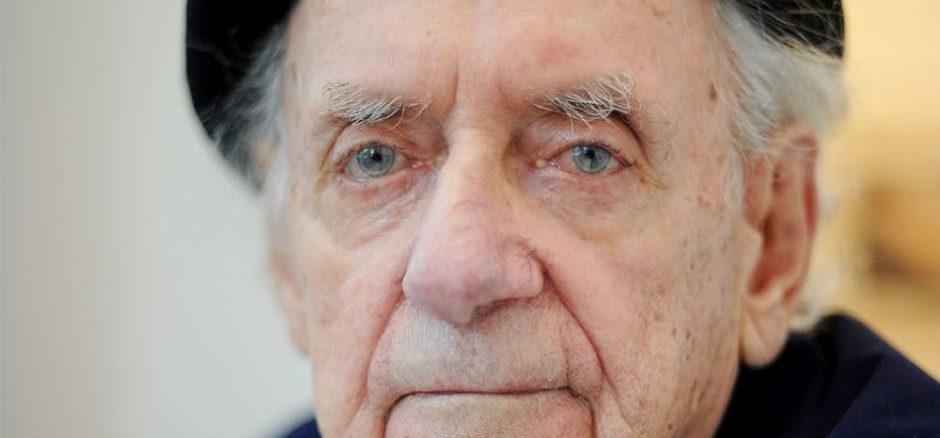
Artist Charles Blackman, known for Alice in Wonderland series, dies aged 90
One of Australia’s greatest painters of the human condition, Charles Blackman, has died in Sydney surrounded by family and friends a week after celebrating his 90th birthday.
Blackman was one of the last of his generation, best known for his paintings that riffed on Lewis Carroll’s Alice in Wonderland.
His son Auguste paid tribute to his father this morning as the most generous of artists.
“He painted out dreams. He painted the dreams of everyone,” he said.
“I’ve never met such a man who could channel emotion the way Charles did in the paint.
Born in Sydney in 1928, Blackman left school at 13 and worked as a newspaper illustrator before travelling abroad and becoming a celebrated artist in the UK and Europe.
He later came to be defined by his membership of the so-called Antipodean movement, with Arthur Boyd, John Brack and others.
In 1959, the group signed an “Antipodean Manifesto”, which was a statement protesting the dominance of abstract expressionism.
Blackman was best known for his Alice in Wonderland series, painted in 1956 and 1957, depicting his wife Barbara as Alice.
Sotheby’s Australia chairman Geoffrey Smith described Blackman as “one of the heroes of the history and development of Australian art in the twentieth century”.
###
Malcolm Turnbull’s opponents are waging a guerilla war to kill off his leadership
Six days after triumphantly walking into the Prime Minister’s courtyard having navigated his energy policy through the hostilities of his coalition partyroom, Malcolm Turnbull is on the precipice.
Last Tuesday was not exactly a Neville Chamberlain peace-in-our-time moment, but the PM’s relief was palpable.
He had got his National Energy Guarantee (NEG) past his colleagues by a healthy margin; for all intents and purposes, his approach on energy policy had been endorsed.
But if war teaches you anything, it is that numbers do not count in an insurgency.
Mr Turnbull is now the target of full-blown guerrilla warfare.
The insurgents may have varying endgames, but their first ambition is clear: to kill off Malcolm Turnbull’s leadership.
So what happens now?
What next — or who — is not agreed by the dissidents.
Some want Peter Dutton to take over, to sharpen the differentiation with the Labor Party and give the Liberal Party that distinctly conservative hue craved by the “base”, that thinning band of greying members.
Some want Tony Abbott back, even if it means first rendering the Coalition Her Majesty’s Opposition once again to “clear out” Turnbull and other moderates.
This is a horror show that has nothing to do with the presumed trigger point, energy policy.
Look at what the last few days have taught us on how the rebels respond.
###
Banking royal commission: ‘Frightening’ levels of financial illiteracy adding to banking industry dysfunction
Many in the finance industry might be breathing a sigh of relief now that another bruising fortnight at the banking royal commission is over and done with.
Once again, bankers and fund managers were put on the stand and asked to explain why they charged fees for no service, or kept dead people on their list of active clients.
Of note, late last week the commission heardclients who invested their super entirely in cash with AMP subsidiary NM Super could in fact go backwards financially because the fees charged on their accounts exceeded the return on their cash investment.
All of these practices date back to the start of the century and have survived several attempts at reform.
But does the blame for “fees for no service”, and excessive fee charging more generally, rest entirely with the banks?
Analysts argue consumers need to take a more active interest in what they are being charged and why.
But before that can happen, there is an acknowledgement Australia has a serious problem with financial literacy.
“It’s quite frightening really,” University of New South Wales’ Business School professor Pamela Hanrahan said.
Most people can relate to the frustration of not being able to figure out a mathematics problem.
But Professor Hanrahan say too many Australians cannot make basic maths calculations.
“All of the studies indicate that there’s a significant portion of people who can’t, for example, work out what 10 per cent of 100 is equal to.”
It also causes us a great deal of stress.
A 2017 survey launched by the Australian Securities and Investments Commission (ASIC) revealed more than a third of respondents said dealing with money was “stressful or overwhelming”.
This daily news roundup is curated with stories from ABC News.
SheSociety is a site for the women of Australia to share our stories, our experiences, shared learnings and opportunities to connect.

Leave a Reply